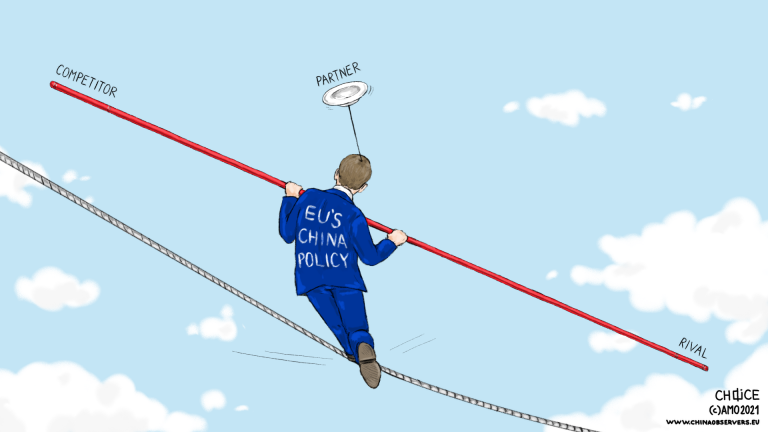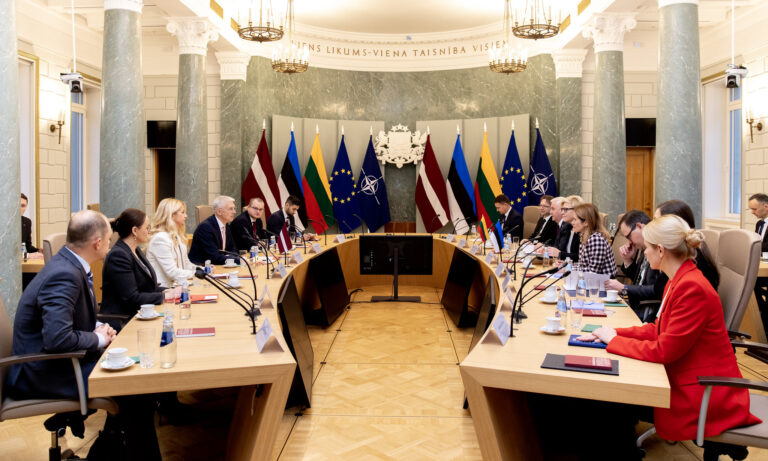
For a long time, the southernmost Baltic state of Lithuania displayed a low threat perception of China, viewing it as a distant emerging superpower with a lucrative market. Yet, if one would ask Lithuania’s national security and intelligence experts about the China threat now, they would arguably respond, “Which one?” Indeed, since 2019, the perception of China has evolved into that of a systemic threat over multiple dimensions, greatly undermining Lithuania’s security.
This article is part of a series of articles authored by young, aspiring China scholars under the Future CHOICE initiative.
It has been a decade since Lithuania published its first National Threat Assessment in 2014, which provided a comprehensive assessment of threats and risks posed to the national security of the Republic of Lithuania. China was first mentioned in the 2015 report among other authoritarian countries as a “friend” supporting Russia and its political regime.
Since then, much has changed, including intensifying Sino-American strategic rivalry, deepening Sino-Russian strategic partnership amidst Putin’s war against Ukraine, and China’s rising assertiveness in Europe and beyond. In light of these decade-long developments on the global, European, and bilateral levels, Lithuania has awakened to the national security implications posed by China. The following is an analysis of the evolution of Lithuania’s threat perceptions of the Asian power from 2015 to the present time.
Minor Security Consideration (From 2015 to 2019)
After 2015, China primarily became a security consideration for Lithuania through its relationship with Russia, which by far has been recognized as the greatest threat to Lithuania’s national security. China was initially listed alongside Iran, Syria, and North Korea – hostile authoritarian countries that support Russia and Putin’s political regime. Beijing’s apparent coordination with Moscow can be illustrated by its veto, together with Russia, of a draft resolution dealing with the Syrian crisis in 2014-2015, when for the first time Lithuania and Estonia served as non-permanent members of the United Nations Security Council (UNSC). Such Sino-Russian convergence on voting was one of many indications of the growing bilateral security cooperation, which has emerged as a concern in the Baltic region. This was further elevated by the 2017 Sino-Russian naval exercises in the Baltic Sea, which lasted two days and involved ship-to-sea firing and anti-aircraft drills. These intense military exercises, to a large extent, encouraged Lithuania to rethink its view of China’s security challenge. However, interestingly, those reassessments were not reflected in the following National Threat Assessment reports.
Lithuania has also recognized Beijing’s enhanced cooperation with Belarus, which has been another source of threat for Lithuania. Notably, the 2017 National Threat Assessment declared that Chinese companies cooperated in developing the Belarussian new generation multiple launch rocket system (MRLS) Polonez. China’s involvement in the armament modernization process and enhancing Belarusian combat capabilities had direct security implications for Lithuania.
In 2018, the understanding of China-related security challenges acquired a new dimension in relation to the cyber domain. The National Threat Assessment identified China’s involvement in hostile cyber activities against Lithuanian state institutions and its energy sector. Indeed, in the Lithuanian cyber domain, China was recognized as being capable of conducting cyber espionage and other cyber activities. However, the report acknowledged that Lithuania had not been among China’s main targets, and that it was Russia that continued to be the primary threat in this domain.
This overview shows that Lithuania’s security consideration of China was slowly taking shape while not yet acquiring a threat dimension. This was tightly linked with Lithuania’s overall foreign policy toward Beijing at the time. During this period, Lithuania’s approach to China revolved around the pursuit of economic opportunities presented by its vast market, which translated into joining the “17+1” format in 2012 and the “Belt and Road Initiative” (BRI) in 2017, overlooking broader security considerations.
This was no different from how the greater European powers, such as France, Germany, or the United Kingdom, were attracted by China’s alluring market. However, since the early 2010s, many countries have awakened to China’s rising assertiveness, namely its growing economic, military, and technological capabilities in the Indo-Pacific and their spillover in Europe, which has correspondingly heightened their threat perception of China. Meanwhile, the small state of Lithuania was somewhat of a latecomer as it awakened to China’s threat only in 2019.
China in the Crosshairs of Lithuania’s Threat Assessment (Since 2019)
It was 2019 that marked a critical juncture in Lithuania’s threat assessment of China. At the beginning of the year, Lithuania was the first among the Baltic states to explicitly define China as a threat to its national security. Indeed, the 2019 National Threat Assessment was the first report since 2014 to consider China as a somewhat independent actor from Russia. The document referred to the increasing activities of Chinese intelligence and security services to gather relevant information and recruit Lithuanian citizens, eventually gaining support for political decisions favorable to Beijing.
Subsequent developments on the European as well as the bilateral level have substantially informed Lithuania’s following National Threat Assessments. In March 2019, the EU presented a joint communication, called “Strategic Outlook” in which China was named as a “partner for cooperation and negotiation,” “economic competitor,” and “systemic rival.” Meanwhile, in its London Declaration, NATO explicitly said that China would emerge as a new strategic focal point for the alliance. On the bilateral level, the Sino-Lithuanian relationship has also exhibited increasingly negative trends, starting from Lithuania being vocal about human rights abuses in Xinjiang to moving to ban the Chinese company Huawei from developing a local 5G network. In reaction to these developments and Chinese reactions, the subsequent 2020 and 2021 National Threat Assessments retained the threat perception and expanded the definition of Chinese activities, from conducting malicious actions in Lithuania’s cyberspace to exploiting the pandemic to expand its influence in the country.
Yet, it was not until 2022 that for the first time, the whole chapter in the National Threat Assessment was dedicated to China. This was a response to Beijing’s initiated covert economic coercion measures against Lithuania due to the opening of a Taiwanese Representative Office in Vilnius, which was followed by a deep crisis of bilateral relations with China that continues to this day. Thus, not surprisingly, the 2022 National Threat Assessment emphasized China’s malign activities in the economic domain.
It is noteworthy that the 2022 and the subsequent 2023 reports expanded their outlook on China to include a comprehensive overview of China’s foothold in the global system, the shaping of digital governance, as well as the global security agenda. Meanwhile, the latest 2024 report declared that Chinese intelligence focus has shifted from being previously mostly interested in information about the “five poisons” (Taiwan, Hong Kong, Tibet, Xinjiang, and Falun Gong) and Lithuania’s role in the EU and NATO to focusing on Lithuania’s internal affairs, political divisions, and foreign policy, ramping up efforts to shape public opinion in favor of China.
Independent Threat Factor, Yet Tightly Knitted with Russia
These observations show that initially, China’s cooperation with Russia and Belarus factored into China becoming a security consideration for Lithuania without ascending to a level of threat as China continued to be seen as a promising economic opportunity. Yet, from around 2019, given China’s increased assertiveness combined with developments on the global, European, and bilateral levels, the security considerations toward China changed dramatically. The National Threat Assessments presented a somber recognition that China is an assertive actor that has its own agency and is politically, economically, diplomatically, as well as technologically capable of acting independently from Russia against Lithuania.
At the same time, since Russia’s war against Ukraine started in February 2022 much emphasis has been brought back to viewing China as a security threat to Lithuania through the lenses of Beijing maintaining and strengthening relations with Russia. With that being said, China’s increasingly assertive, and, on occasion, confrontational external behavior coupled with its partnership with Russia will further entrench Lithuania’s concerns about China. The threat perception is likely to persist despite the possible normalization of diplomatic relations with Beijing and the interest of Lithuania’s opposition parties to change the direction of China policy after the upcoming elections in May. Moreover, Lithuania’s threat perception of China will also continue to be shaped by the still-being-designed EU’s policy of de-risking from China on the economic and technological front, as many EU countries recognize the vulnerabilities associated with their dependencies on China.
Written by
Elzė Pinelytė
ElzePinelyteElzė Pinelytė is Associate Expert at the Geopolitics and Security Studies Center (GSSC), Lithuania, where she studies China's domestic politics and foreign policy, with a focus on Sino-EU relations and its recent developments.


